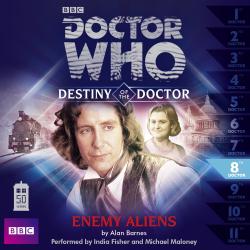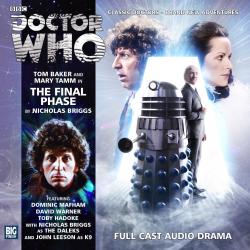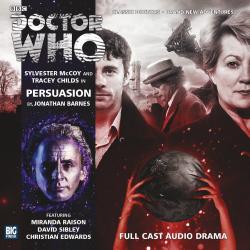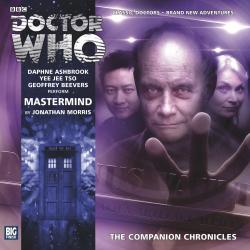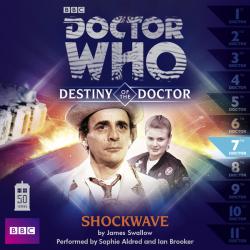Starlight Robbery (Big Finish)
Friday, 6 September 2013 - Reviewed by
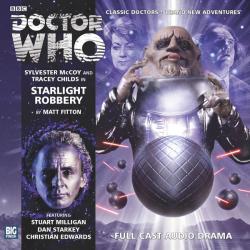
Starlight Robbery
Produced by Big Finish
Written by Matt Fitton
Directed by Ken Bentley
Released: August 2013
What remains a surprise throughout the duration of the story is the effectiveness with which its scribe Matt Fitton develops upon what is a fairly traditional premise. The action picks up moments after the conclusion of Persuasion, with Sylvester McCoy’s Seventh Doctor, Tracey Child’s Klein and Christian Edwards’ Will all intent on discovering the whereabouts of the lost Persuasion device and its creator Kurt Schulk. Their search leads them to an intergalactic auction featuring a plethora of galaxy-threatening weaponry, forcing the TARDIS crew to engineer a devious heist in order to gain access to the ultimate prize.
Unless listeners manage to somehow experience Starlight Robbery without glancing at its cover art, they’ll already have noticed that the Sontarans are due a comeback in this piece. Sure enough, faster than you can yell ‘Atmos’, the classic adversaries make their entrance heard in the midst of the auction and pose an additionally dangerous dilemma for the Time Lord at its heart. Dan Starkey is rightly offered full vocal control over the various soldiers of this particular Legion and he manages to intelligently differentiate between the dialects and colloquialisms of each of the different soldier roles he inhabits. Naturally, there are instances where Starkey’s recent regular work as Strax on the show has an influence on his portrayal, yet this only serves to enhance his contribution to proceedings rather than acting in any detrimental manner.
Before the Rutans’ most notorious foes even take to the stage, though, this release’s finest asset is introduced in subtle but sublime fashion. Jo Woodcock takes on the role of the flirty and rather vivacious entrepreneur Ziv with a zestful and enriching energy that allows her to dominate each and every sequence she appears in, regardless of the extent to which she appears or indeed the level of challenge the dialogue places before her. Refreshing as it is to see McCoy in particular on such strong and consistent form as his incarnation of the Doctor, always the prospect of discovering fresh and invigorating new blood on-screen or in these audio releases is just as thrilling, doubly so in the case of the supremely talented Woodcock here.
Similarly unexpected and yet beneficial is Fitton’s capability to relax the arc stands of the 2013 Seventh Doctor trilogy so as to allow himself to convey a standalone, layered tale without the restraints of specific narrative elements holding back his own creative vision. Whereas Persuasion occasionally seemed confined by the expectations of the events it had to fulfil and pre-empt, Starlight Robbery serves as a great interlude before a presumably climactic confrontation of wits in the upcoming finale. Despite the return of Black And White’s elusive conman Garundel (played marvellously by Stuart Milligan once again) and the continuation of the search for Schultz’s masterpiece, there’s plenty of standalone content here that won’t likely leave newcomers to the range too confused as to exactly ‘what’s occurring’, in the elegant words of Gavin & Stacey’s Nessa.
Undoubtedly, the metaphorical glue which holds it all together is the intelligent structure that Fitton engineers as the backbone of his drama. At no stage in the four ‘episodes’ of the piece does any notable lapse in momentum occur, even in the more intricate and reserved exchanges between main and supporting characters aboard spaceships, storage crates and the various other modes of transportation which they hop aboard. Plot twists are dispensed equally in such a manner that listeners will frequently find themselves lulled into a false sense of security or foreknowledge, only to eventually discover that their understanding of events to come is minimal and inaccurate at the best of times.
If a minor inferior element of this second instalment must be uncovered, then it is arguable that a singular flaw lies in its climax. Fans of the Doctor Who stories broadcast in the show’s first decade may find themselves experiencing déjà vu as Starlight Robbery draws to a close, with a familiar spaceship cruiser’s interior sound effect employed in the final scene as a teaser of what’s to come next time. For this reviewer, the conclusion of Frontier In Space came to mind, although on the whole the effect of this supposed shortcoming is minimal, with the scene in question handled in such a manner that its dramatic impact is intense enough to justify its relative familiarity.
When Daleks Among Us does arrive in stores later this month, then, it faces a battle on dual fronts. On the one hand, writer Alan Barnes must engineer resolutions to narrative arcs such as the Klein mystery, the manipulation of the Persuasion machine and the foreboding trap which the titular antagonists and their creator have set for the Doctor. On the other hand, in following on from Starlight Robbery, Barnes acquires the unenviable task of matching or bettering what is to this reviewer’s mind one of the greatest single releases that Big Finish have produced since their inception. Starlight Robbery represents everything that makes the programme a success fifty years on- the intricate narratives, the accomplished performers, the supreme dramatic impact of it all- and without a doubt Fitton’s finest hour writing for the range. If you’ll pardon the pun, it’s stellar in every sense of the word, and for this reviewer Doctor Who’s 50th Anniversary Special has truly come early.
